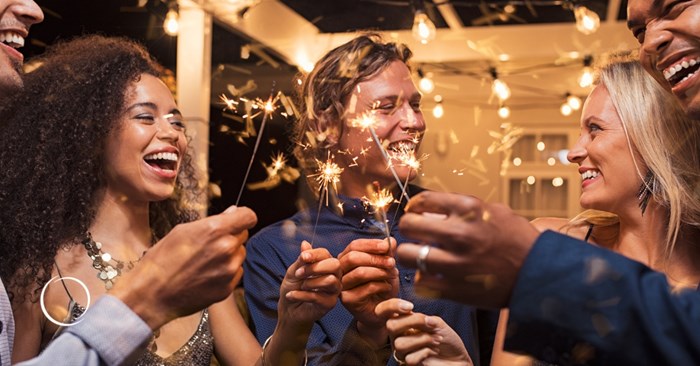Ringing in the New Year after plastic surgery: When can you party and when should you reach for a mocktail instead?

It's that special time of year when everything seems merry and bright, and you want to put your best face forward for those holiday parties, festive gatherings and late-night work events. For some, that involves plastic surgery, either a nip and tuck here or a bit of filler there.
However, depending on the procedure and recovery timeline, as Constantino Mendieta, MD, suggested, you may want to ho-ho-hold that cocktail. If you are choosing to enhance your appearance with plastic surgery this holiday season, you need to know when it's okay to pop the cork on the bubbly and when you need to reach for a mocktail instead.
When is it safe to party after plastic surgery?
Plastic surgery may make you look and feel "holiday party-ready," but depending on the procedure and when you had the surgery, you may need to skip one buzzworthy holiday gathering staple – alcohol.
Alcohol and painkillers do not mix. Alcohol is a depressant, and combining it with other medications, especially those to control pain and other side effects of surgery, can potentially be deadly.
"When mixed with other medications, alcohol can sometimes have unpredictable effects, like making you loopy or confused, lethargic, intoxicated with smaller amounts than normal," said Anureet Bajaj, MD.
The body's natural healing process does not mix well with alcohol. Studies suggest that alcohol consumption can significantly affect wound healing by triggering an inflammatory response. While some inflammation is a natural part of the healing process, excessive inflammation slows healing and can increase pain, discomfort and recovery, delaying healing. Alcohol can also deplete the body of essential vitamins and minerals necessary for tissue repair.
"Alcohol also dehydrates you, and I also worry that if you start to consume alcohol too soon after surgery, you may not focus on other things that your body needs to heal, such as adequate hydration, protein and vitamins," said Dr. Bajaj.
Patients are usually eager to see their final results following a cosmetic procedure, but indulging in those holiday cocktails may prolong the wait to see your ultimate transformation in the mirror.
"Alcohol tends to thin the blood, dilating the blood vessels and making the platelets less able to stick together and form a clot," said Jeffrey Roth, MD, FACS. "This may increase bruising and swelling. This can also increase recovery time."
Want to toast your new look?
You need to allow your body the time to fully recover first.
"It is best to avoid alcohol for one week prior to any surgical procedures and two weeks for larger surgical procedures," said Kristy Hamilton, MD. "It's best to follow that advice strictly."
Dr. Mendieta recommended abstaining from alcohol for at least 24 hours after minimally invasive procedures involving neuromodulators, such as Botox, or dermal fillers. Dr. Roth was a little more conservative, recommending patients avoid alcohol for at least 24 to 48 hours after injections.
For those who do consume alcohol after neuromodulators or dermal fillers, there may be immediate consequences for their results.
"The patient may experience more bruising and swelling if they do indulge around the time of the procedure," said Dr. Hamilton.
Dr. Mendieta also suggested that patients avoid alcohol for at least three to four weeks after significant facial surgeries and body procedures like tummy tucks.
It is vital for patients to follow their plastic surgeon's specific guidance based on the type of surgery, healing progression and individual needs. Like a snowflake, every patient is unique. Your board-certified plastic surgeon will know what is right for you based on the specific circumstances of your surgery and situation.
Dr. Mendieta also shared some helpful mocktail magic so you can celebrate safely and not feel deprived postop. For a holly, jolly recovery, he suggested non-alcohol mocktails and sophisticated alternatives to cocktails like sparkling mineral water with fruit, non-alcoholic spirits and fancy, flavorful spritzers.
If you can't consume alcohol, consider volunteering as a designated driver to help family and friends get home safely. You can also attend events earlier in the evening when cocktails and alcohol are less likely to be served.
"Remember, your health and safety should always come first," said Dr. Mendieta. "By following postoperative care instructions, including avoiding alcohol, you're giving yourself the gift of a smooth recovery, maximizing your results."
Good things come to those who wait, allowing you to say "cheers" to a new you in the new year.
To find a qualified plastic surgeon for any cosmetic or reconstructive procedure, consult a member of the American Society of Plastic Surgeons. All ASPS members are board certified by the American Board of Plastic Surgery, have completed an accredited plastic surgery training program, practice in accredited facilities and follow strict standards of safety and ethics. Find an ASPS member in your area.
